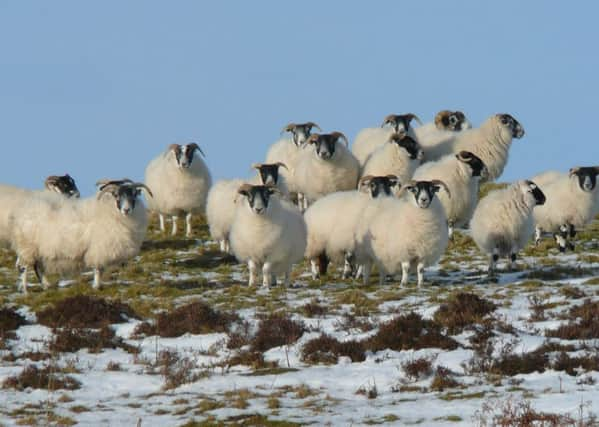Farmers urged to change land use to safeguard food supplies


Despite differences in the physical challenges facing lowland and upland farmers across Scotland, the UK and Europe, water quality and flooding concerns are common to both, and management decisions and land use changes in the uplands can have major implications for the lowlands.
Key initiatives are already being implemented in Scottish agriculture to benefit the environment and battle greenhouse gas emissions, including restoration of peatlands, expanding woodlands, increasing biodiversity and improving waterways. But experts say an increase in livestock production will also be required to satisfy the growing need for food worldwide.
Advertisement
Hide AdAdvertisement
Hide AdAround three-quarters of Scotland’s land is under agricultural production, and the sector was worth £777 million to the country’s economy in 2014.
Dr Beth Wells, a biologist and disease researcher at Moredun Research Institute, believes all sectors must come together to identify the most sustainable solutions.
She said: “We need to work together on how to improve the environment, decrease our carbon footprint and increase livestock production efficiency.
“It has to be sustainably intensified to keep up with requirements but also to improve efficiency and cut its impact on the environment.
“Livestock farming is very important to the Scottish economy but it is also a major contributor to greenhouse gas emissions … alongside this we also have an increasing demand for food, including red meat, globally. What we need is sustainable intensification, and for us that is by effective disease control.”
An increase in pests and diseases is being driven by higher temperatures and increasingly wet conditions. Some, such as cryptosporidium, can also be passed on to humans through contamination of water supplies. Cryptosporidium causes respiratory and gastrointestinal illness and is one of the major killers of children in developing countries.
Dr Wells said: “Diseases and parasites like liver fluke and cryptosporidium are massive problems to Scottish agriculture and have a real effect on livestock production efficiency.”
She added: “There‘s usually a trade-off, but there are also all-win situations.
Advertisement
Hide AdAdvertisement
Hide Ad“A lot of the control strategies to keep cryptosporidium out of water supplies would also help with livestock production and efficiency, as well as public health. It also benefits things like fisheries, water quality in rivers, biodiversity.
“With the water catchment work, for instance, we have situations where it is environmentally advantageous, it is advantageous to the farmer and to the land manager and the water industry – which also services a massive number of other sectors in Scotland, from bottled water to whisky.”
Dr Wells will be speaking about the subject at a conference this week on the future of farming in Scotland, organised by Scotland’s Rural College (SRUC) and the Scottish Environment Protection Agency.
Davy McCracken, professor of agricultural ecology at SRUC, said: “There can be marked differences in the agricultural and environmental challenges facing our lowland, upland and crofting farming systems. But all have one thing in common: in order to be truly sustainable into the future, the systems being practiced will need to change markedly.
“In particular our future farming systems will need to involve more sustainable use of resources and greater integration with other land uses.
“Although this conference is set in Scotland, the need to ensure such integrated land use is a global imperative, and over the two days we will be hearing about the complexities associated with achieving such integration in practice.
“I hope our discussions and deliberations will help improve understanding of the land use changes that will be needed, and the policy that will need to be put in place.”